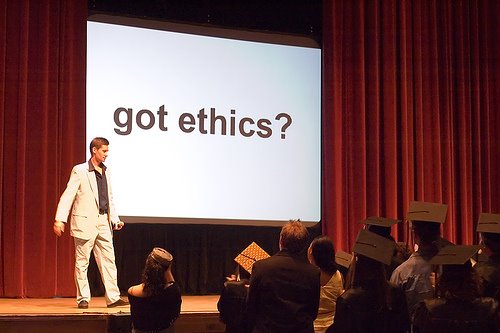Over at Above the Law, Mark Herrmann was commenting yesterday on ways for associates to screw up. Hermann is a terrific writer, and author of the highly regarded Curmudgeons Guide to Practicing Law that I reviewed in 2008, as well as Inside Straight, a collection of his writings from Above the Law.
But he said one thing in yesterday’s piece that really jumped out at me, as he discussed an article from another site on that subject. And that had to do with a lawyer’s personal demeanor, which I’ve bolded for you since block quotes generally suck:
The folks in the Law360 article did okay. Their six ways for associates to disappoint were: Don’t (1) be visible enough, (2) take ownership of your work, (3) be thorough, (4) be pleasant, (5) know how to talk on the phone, and (6) sow the seeds of business development.
I’m deeming numbers 1 (visibility) and 6 (developing business) to be duplicative and 5 (talking on the phone) to be penny-ante. And, personally, I don’t much care about number 4 (being nice). Maybe I’m out of the mainstream here, but I’m the person who said: “Attila the Hun? Guy’s got a nasty mean streak, but at least he can do his job. Hire him.” I’ll accept an awful lot of personality quirks in exchange for the chance to work with someone who’s smarter than I am and writes and speaks better than I do.
Ugh. This violates my First Rule of Lawyering: Don’t be Attila the Hun.
But why?, I hear some of you cry! We’re supposed to be tough as nails in litigation and doing everything possible (within the law) to win!
And here’s the issue: During the course of the litigation there will be a time when one side needs an extra day or week for something. And you don’t know if that someone will be your client or someone else.
If your client is scheduled for a court-ordered deposition on October 10, for example, and it happens to be the week she is taking a short vacation, or the day of her daughter’s 2nd grade play, you want to be able to pick up the phone and request common courtesies for a new day. So long as there is no genuine strategic issue, that serves the client well.
But if you have been acting like Attila the Hun and thought it was good lawyering to deny even small courtesies to the other side? Well, guess what?
The other lawyer might tell you to go jump in the lake when the shoe is on the other foot. What goes around comes around. Karma. And all that.
That courtesy might not be granted. To the detriment of your client. Because you thought you could act like Attila the Hun on something in a Take-No-Prisonors litigation strategy.
Keeping a good, working professional relationship with the adversary’s counsel, while still doing what you are retained to do, is often a tough thing. Tempers may flair if you aren’t careful in even the most routine deposition.
This doesn’t mean that the lawyer stops short of arguing his heart out just to be nice, only that there is an art to disagreeing without being disagreeable.
All of this comes home to roost, often, if one side or the other wishes to talk settlement. Sitting down for a cup of coffee with Attila to discuss why a settlement should be more/less beneficial to the client, may be difficult if someone was acting like a jerk. Sitting down with a human is much easier.
And that is what serves the client.
A story I’ve told before and I’ll tell again: When I was in law school I watched my father try a medical malpractice case in Brooklyn. He and the other lawyer would go head-to-head in the courtroom, acting within every meaning of the phrase “zealous advocacy.” Then they would grab a cup of coffee together after court.
Best lesson in the law I ever had.


